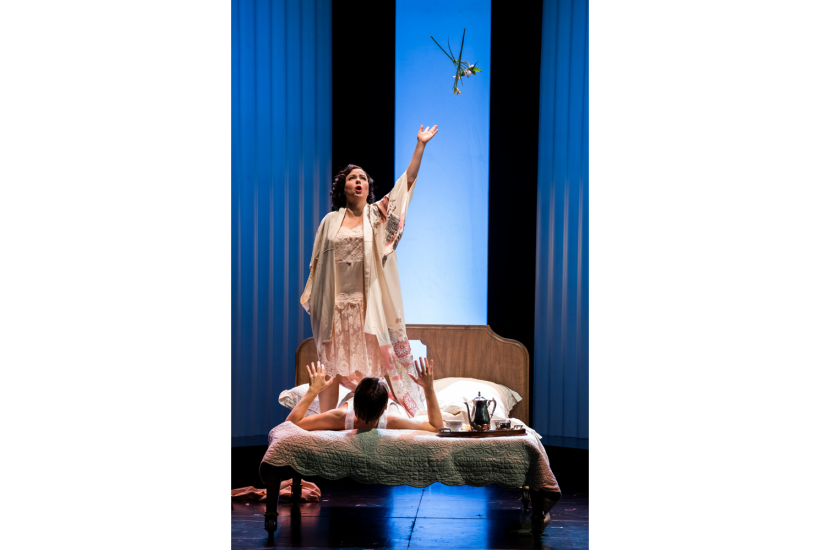Opera North is ending its autumn season with a big-hearted production of a lopsided opera. There’s much to love about Puccini’s La rondine, and much to drive you up the wall. This bittersweet love story about an older woman and a younger man, set in Paris and Nice and channelling the operetta sweetness and sparkle of Puccini’s great friend Lehar, ought to sweep you off your feet. Instead, it tempts critics into that most shameless form of condescension, the armchair rewrite. Giacomo, old chap, isn’t five minutes into Act One a bit soon to be introducing your big hit aria? We’re halfway through Act Two: shouldn’t the lovers be together by now? And isn’t this basically just La traviata played for lower emotional stakes? Come on, man, you wrote Bohème. Why am I having to tell you this?
One way or another, though, there’s still something vital at the heart of La rondine and James Hurley’s production went all out to make it sing. This is Opera North’s Green Season, so the sets were recycled. In truth it looked like a fairly standard ON touring show: not much budget but plenty of imagination, with skilful lighting (by Paule Constable and Ben Pickersgill) to suggest a Paris sunset or a Riviera morning. There’s energetic dancing in the Paris nightclub. Crowds adopt languid poses in tailcoats and flapper dresses, and Magda (Galina Averina) and Ruggero (Sébastien Guèze) share their much-delayed first kiss beneath a cascade of flowers. Again: modest means, but striking results.
Averina makes a tender but spirited Magda, etching sweet arcs of melody on the evening sky. She’s vulnerable, but not brittle; and as often happens in this opera, she made an altogether more engaging impression than her underwritten toy boy Ruggero. Guèze was persuasive as a naive and sentimental lover, but his voice simply isn’t as luminous as Averina’s. Elgan Llyr Thomas was a much more compelling presence as the poet Prunier: dapper, articulate, singing with easy charm. Again, that’s partly Puccini’s fault (it’s possible to get quite a long way into La rondine before you realise that Prunier isn’t actually the hero); but Thomas was great fun nonetheless, and made you wish Puccini had given us more of Prunier’s easy-come, easy-go romance with the maid Lisette (Claire Lees, who had just the right blend of tartness and authentic soubrette sparkle).
Kerem Hasan conducted, and it really did sound sumptuous: silvery millefeuille strings, caressing woodwinds and long-sighing waltz melodies decked with jewel-like spritzes of harp and tuned percussion. True, La rondine isn’t exactly 24-carat material. But even semi-precious Puccini is better than a lot of what’s out there, and if you can take this flawed opera on its own well-meaning terms, this is a production that offers real rewards.
Two orchestral concerts offered a robust corrective to the notion – and it just won’t die – that orchestras nowadays all sound the same. It’s highly subjective, of course, but I don’t think I imagined how distinctive the National Symphony Orchestra of Ukraine (under its conductor Volodymyr Sirenko) sounds when compared with any current UK ensemble. Traditionally, orchestras trained in what we used (all too lazily) to call the Russian school were noted for the wiry intensity of their strings and the almost operatic vibrato on their brass sound.
Some of that’s still there, for sure; but coupled to a finesse that wasn’t always audible on those old Melodiya LPs. The string tone is close-packed and dense, which made for an impassioned rather than brilliant Strauss Don Juan, and a Sibelius Finlandia which sounded unusual for reasons that were hard to pinpoint until I clocked that they were phrasing the opening brass paragraphs and the central hymn like a chant rather than a chorale. These cultural differences still matter, and, after all, Finlandia began life as a protest against Russian imperialism. Sirenko and the NSOU finished with the big, overcast Second Symphony (1936) by the Ukrainian composer Boris Lyatoshinsky. Imagine, for better or for worse, a Soviet Bax. They played it with surging conviction.
In Liverpool, meanwhile, Domingo Hindoyan and the Royal Liverpool Philharmonic Orchestra performed Mahler’s Fifth Symphony with such polish and sweep that it raised an unworthy thought: is Mahler becoming too easy? Certainly, Hindoyan has added a new layer of glamour to the Liverpool strings, and the horns, too, were on heroic form, striding through the texture and moving as one. Hindoyan keeps his passions under tight control and if much of the symphony felt almost classical, it all paid off at the very end, when the crowning brass hymn welled up and broke over the whole orchestra like Nietzsche’s great noontide. If someone can listen to the NSOU and the RLPO and genuinely can’t hear the difference, you can probably discount anything else they have to say about orchestral music.
Got something to add? Join the discussion and comment below.
Get 10 issues for just $10
Subscribe to The Spectator Australia today for the next 10 magazine issues, plus full online access, for just $10.
You might disagree with half of it, but you’ll enjoy reading all of it. Try your first month for free, then just $2 a week for the remainder of your first year.








Comments
Don't miss out
Join the conversation with other Spectator Australia readers. Subscribe to leave a comment.
SUBSCRIBEAlready a subscriber? Log in